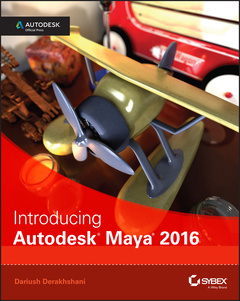Description
Introducing Autodesk Maya 2016
Autodesk Official Press
Author: Derakhshani Dariush
Language: English
Subject for Introducing Autodesk Maya 2016:
Keywords
Autodesk Maya 2016; Maya 2016; Introducing Autodesk Maya: Autodesk Official Press; Randi L; Derakhshani; Autodesk Maya; Maya guide; Maya manual; Maya handbook; Maya tutorials; learning Maya; Maya for beginners; Maya animation; Maya hands-on; Maya training; Maya instruction; Maya modeling; Maya effects; Maya beginners guide; teaching yourself Maya; Maya 3D; professional Maya; Maya basics; Maya plug-ins; Maya step-by-step; learning animation; Maya simulations; Maya learning by doing; Maya projects; Maya examples; Maya interface
624 p. · 18.8x23.4 cm · Paperback
Description
/li>Contents
/li>Biography
/li>
Introducing Autodesk Maya 2016 is the official guide to the most popular and complex 3D application on the market. Building from the ground up, this book combines straightforward text with practical examples that make it easy to absorb the basics and start designing and animating your own digital models and scenes. The tutorials offer realistic challenges and clear explanations, laid out in fun, step-by-step lessons that help you gain confidence and learn by doing. You'll delve into CG and 3D core concepts and production workflows, then get right to work designing an animation of the solar system as you learn the interface and basic tools. As your modeling skills grow, you'll build a steam locomotive, a starfish, a table lamp, and much more as you learn to rig your model for animation, create fabric motion with nCloth, and add the lighting and effects that bring your scenes to life. The companion website features downloadable project files that help you see how the pros do it, and the book includes real-world examples from talented users who were beginners just like you.
- Master the Maya 2016 interface, menus, and plug-ins
- Begin building simple animations right away
- Explore modeling, rendering, animation, and cloth motion
- Add lighting, rendering, dynamics, simulations, and effects
If you want to work like the pros, Introducing Autodesk Maya 2016 is the perfect primer for getting started.
Introduction xiii
Chapter 1 Introduction to Computer Graphics and 3D 1
A Preview of the CG Process 2
The CG Production Workflow 2
Digital Images 4
Summary 9
Chapter 2 Jumping into Basic Animation Headfirst 11
You Put the U in User Interface 12
Project: The Solar System 17
Creating a Project 17
The Production Process: Creating and
Animating the Objects 19
Hierarchy and Maya Object Structure 32
The Solar System, Resumed 34
Outputting Your Work: Playblasting 41
Summary 42
Chapter 3 The Autodesk® Maya® 2016 Interface 45
Navigating in Maya 46
Exploring the Maya Layout 46
Building a Decorative Box 58
Mapping the Box’s Reference Planes with Hypershade 61
Organizing Workflow with the Layer Editor 67
Modeling the Decorative Box 68
Editing the Decorative Box Model Using the Shelf 73
Continuing the Decorative Box Model 77
Finishing the Decorative Box Model 80
Summary 87
Contents
Chapter 4 Beginning Polygonal Modeling 89
Planning Your Model 90
Polygon Basics 92
Poly Editing Tools 94
Putting the Tools to Use: Making a Cartoon Hand 101
Creating Areas of Detail on a Poly Mesh 110
Modeling a Catapult 124
Summary 153
Chapter 5 Modeling with NURBS Surfaces and Deformers 155
NURBS for Organic Curves 156
Using NURBS Surfacing to Create Polygons 163
Converting a NURBS Model to Polygons 165
Using Artisan to Sculpt NURBS 167
Creating a Pair of Glass Candle Holders 167
Modeling with Simple Deformers 175
The Lattice Deformer 180
Animating Through a Lattice 185
Summary 188
Chapter 6 Practical Experience! 189
Evaluating the Toy Plane 190
Building the Landing Pontoons 192
Oh, What a Body! Modeling the Body of the Plane 208
The Rear Stabilizers 213
You Spin Me Right Round—The Engine and Propeller 217
The Plane’s Wings 221
Assembling the Plane 230
Summary 232
Chapter 7 Autodesk® Maya® Shading and Texturing 233
Maya Shading 234
Shader Types 234
Shader Attributes 238
Shading and Texturing the Toy Plane 242
Textures and Surfaces 247
Textures and UVs for the Red Wagon 256
Photo-Real Mapping: The Decorative Box 292
Toon Shading 309
For Further Study 312
Summary 312
Chapter 8 Introduction to Animation 315
Keyframe Animation: Bouncing a Ball 316
Throwing an Axe 327
Replacing an Object 338
Animating Flying Text 340
Animating the Catapult 344
Summary 349
Chapter 9 More Animation! 351
Skeletons and Kinematics 352
Skeletons: The Hand 368
Inverse Kinematics 383
Basic Relationships: Constraints 387
Basic Relationships: Set-Driven Keys 392
Rigging the Locomotive 396
Creating a Simple Character Rig 404
For Further Study 413
Summary 414
Chapter 10 Autodesk® Maya® Lighting 415
Basic Lighting Concepts 416
Maya Lights 420
Light Linking 427
Adding Shadows 429
Raytracing Soft Shadows 433
Mental ray Lighting 434
Mental ray Physical Sun and Sky 436
Lighting Effects 440
Assembling and Lighting a Scene 444
Further Lighting Practice 452
Tips for Using and Animating Lights 452
Summary 454
Chapter 11 Autodesk® Maya® Rendering 455
Rendering Setup 456
Previewing Your Render: The Render
View Window 465
Setting the Default Renderer 467
Reflections and Refractions 468
Using Cameras 470
Motion Blur 478
Batch Rendering 479
Rendering the Wine Bottle 480
Mental ray for Maya 485
Render Layers 491
Final Gather 502
Ambient Occlusion 506
HDRI 515
Displacement Mapping the Decorative Box 518
Rendering the Scene with mental ray 530
Summary 541
Chapter 12 Autodesk® Maya® Dynamics and Effects 543
An Overview of Maya Dynamics 544
Rigid Bodies 544
Rigid Body Dynamics: Shoot the Catapult! 548
nParticle Dynamics 556
Emitting nParticles 556
Animating a Particle Effect:
Locomotive Steam 564
Introduction to Paint Effects 573
Getting Started with nCloth 577
Customizing Maya 583
Summary 588
Where Do You Go from Here? 588
Index 589
Dariush Derakhshani is an award-winning visual effects supervisor, author, and educator whose work has appeared in The Fantastic Four, Pan's Labyrinth, the South Park TV series, and countless commercials and music videos. An Autodesk Certified Instructor, he teaches 3D animation and is the author of previous editions of Introducing Maya. Dariush is coauthor of the Autodesk 3ds Max series of books.




